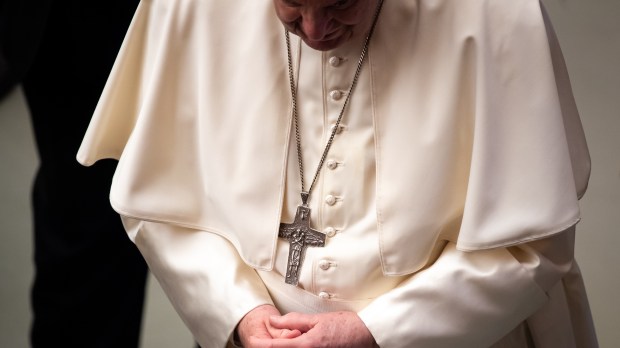Pope Francis gave his traditional Christmas address this December 22 to those who assist him in governing the Church, the Roman Curia.
The Pope spoke of gratitude, kindness, mercy, vigilance, and forgiveness.
The opening reflection was about gratitude, and is an invitation that applies to all of us as we end the year:
Once more, the Lord grants us the grace of celebrating the mystery of his birth. Each year, kneeling before the Child lying in the manger (cf. Lk 2:12), we can look at our lives in this special light. It is not the light of the glory of this world, but “the true light, which enlightens everyone” (Jn 1:9). The humility of the Son of God who partook of our human condition is, for us, a lesson in seeing things as they really are. Just as he chose poverty, which is not merely the absence of wealth, but utter simplicity, so too, each of us is called to return to what is essential in our own lives, to discard all that is superfluous and a potential hindrance on the path of holiness. And that path of holiness is non-negotiable.
At the same time, we need to realize clearly that in reviewing our lives and our past, we should always begin with the remembrance of all the good we have known. For only when we are conscious of the Lord’s goodness to us can we also give a name to the evil that we have experienced or endured. The realization of our poverty, without the realization of God’s love, would crush us. Consequently, the interior attitude that we should deem most important is gratitude.
The Gospel, to explain this gratitude, recounts the story of the ten lepers who were all healed by Jesus; yet only one of them, a Samaritan, returned to thank him (cf. Lk 17:11-19). His act of thanksgiving obtained for him, in addition to his physical healing, complete salvation (cf. v. 19). His encounter with the goodness bestowed on him by God was not superficial; it touched his very heart. That is how it is: Without a constant exercise of gratitude, we would end up simply cataloguing our failures and lose sight of what counts most: the graces that the Lord grants us each day.
Much has happened in the course of this year and, before anything else, we want to thank the Lord for all his blessings. Yet we hope that among those blessings is that of our conversion. Conversion is a never-ending story. The worst thing that could happen to us is to think that we are no longer in need of conversion, either as individuals or as a community.
To be converted is to learn ever anew how to take the Gospel message seriously and to put it into practice in our lives. It is not simply about avoiding evil but doing all the good that we can. That is what it means to be converted. Where the Gospel is concerned, we are always like children needing to learn. The illusion that we have learned everything makes us fall into spiritual pride.
Read the rest here.


